Curriculum
Curriculum Rationale
Our curriculum rationale aims to provide an inclusive, adaptive and enriching educational framework, designed to meet the diverse needs of pupils with Special Educational Needs (SEN). Our rationale is guided by national standards and frameworks, best practices, research and policies in special education, and local authority advice to ensure that every child achieves their full potential in a supportive and stimulating environment.
Core Principles
Inclusivity and Accessibility
- Individualised Learning: Adaptive teaching and learning approaches, tailored to meet the diverse needs and abilities of each pupil, ensuring all can access the curriculum.
- Integrated Curriculum: Ensuring all pupils can access the curriculum through multiple means of engagement, representation, and expression.
- Equality and equity: Ensuring all pupils receive equality of regard, and appropriate levels of support towards empowering them as active participants in the learning process
Holistic Development
- Academic Growth: Developing relevant academic skills that offer all our pupils broad and balanced learning experiences, progression and continuity, enabling them to make links and build up a long-term arc of knowledge and understanding.
- Personal Growth: Promoting social, emotional, and personal development through life skills, communication, and social interaction. This includes sensory regulation, supporting emotional well-being by timetabled sensory circuits or Zones of Regulation.
Functional Skills and Independence
- Life Skills: Preparing pupils for daily living with practical skills in meaningful activities that promote independence.
- Transition Planning: Preparing pupils for post-16 provision with a focus on further education, potential employment, supported and assistive living.
- Careers Program: Providing opportunities for work-related learning and vocational skills development.
Collaborative and Supportive Environment
- Multidisciplinary Approach: Engaging teaching staff, therapists, parents, and external agencies in our pupils’ educational journey.
- Family Engagement: Encouraging active participation of families in the life of school and to continue children’s learning at home.
- Relationships: Empowering all pupils to learn with and alongside others, to feel they belong to a learning community, to be respectful, and to develop lasting friendships.
Assessment
- Personal Plans (PPs): Regularly reviewing and updating PPs, based on pupils’ Education, Health and Care Plan (EHCP) outcomes, to reflect each pupil's progress and changing needs.
- Assessment for Learning: Updating summative and formative assessment systems to inform teaching and planning, as well as providing feedback to all parties involved in each pupil’s learning, and to pupils themselves.
Curriculum Structure
Riverwalk Curriculum Pathways
Pathways
To ensure we can meet each child’s educational needs as closely as possible, our curriculum is arranged into three pathways:
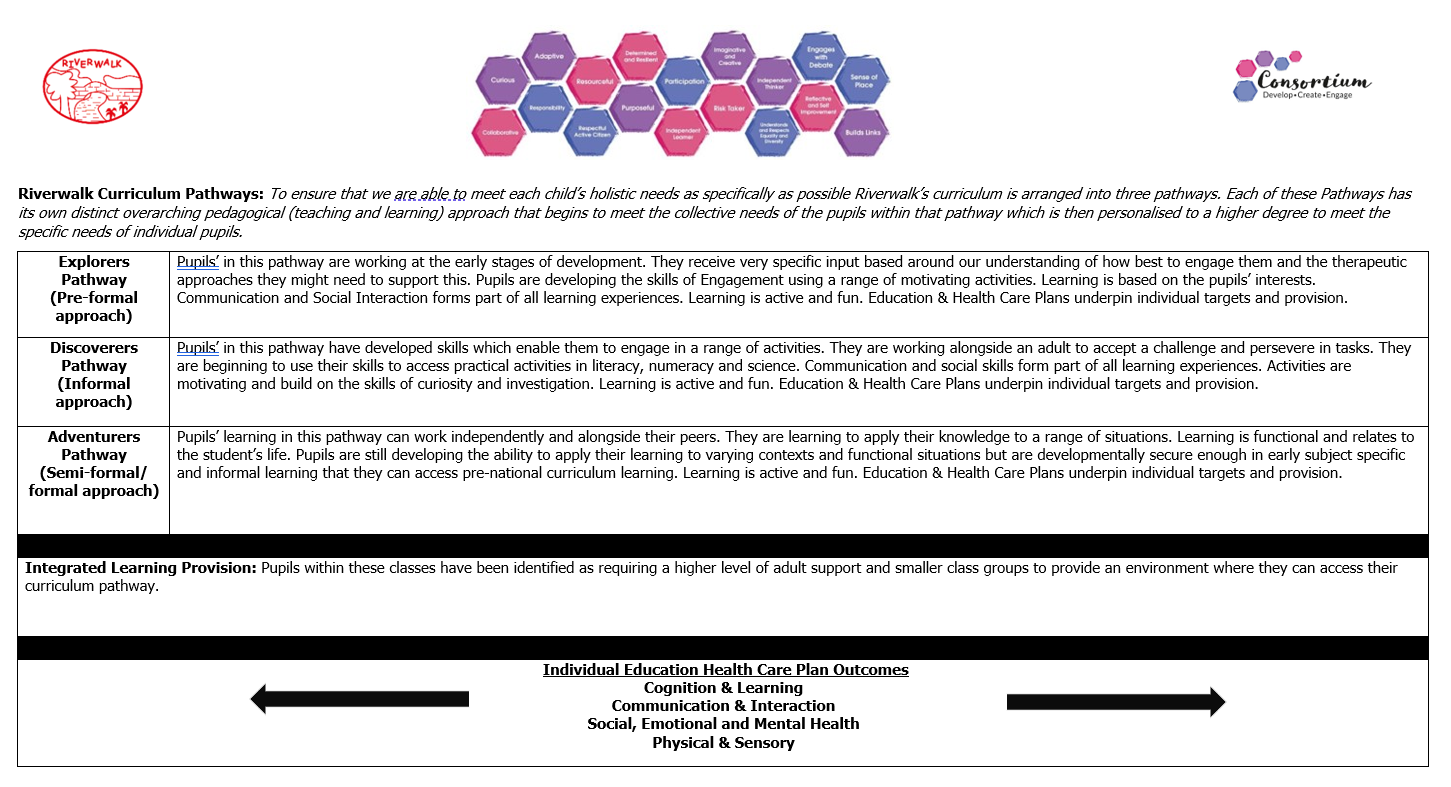
Each of these Pathways has its own distinct overarching pedagogical approach that meets the needs of the pupils within that pathway, including specific learning intentions. Communication and social skills underpin all learning experiences. All activities are planned to be motivating and build on the skills of curiosity and investigation. Pupils are encouraged to use their skills to access practical and meaningful activities. Learning is often functional and relates to the pupil’s life. Education, Health and Care Plans provide individual targets, informing pupils’ personal plans, and woven through different, planned activities.
Explorers are working at the early stages of development, operating predominantly within the Engagement Profile.
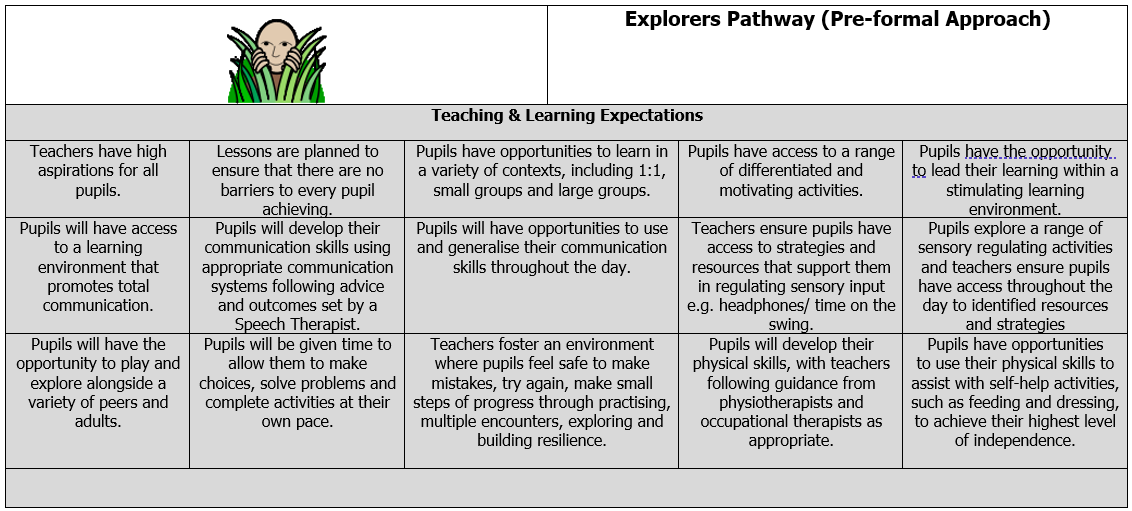
Discoverers are able engage in a wider range of activities. They are working alongside an adult/peer to accept a challenge and persevere in tasks. Some pupils may engage in subject- specific learning.
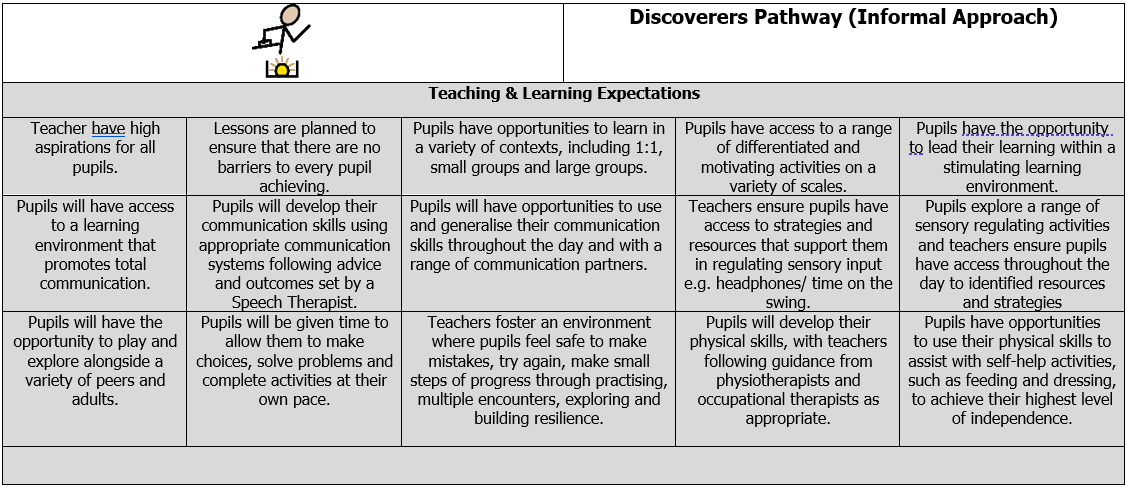
Adventurers are learning to apply their knowledge and understanding to a range of situations. They can work independently and alongside their peers. Most pupils are generally able to access all subject- specific learning.
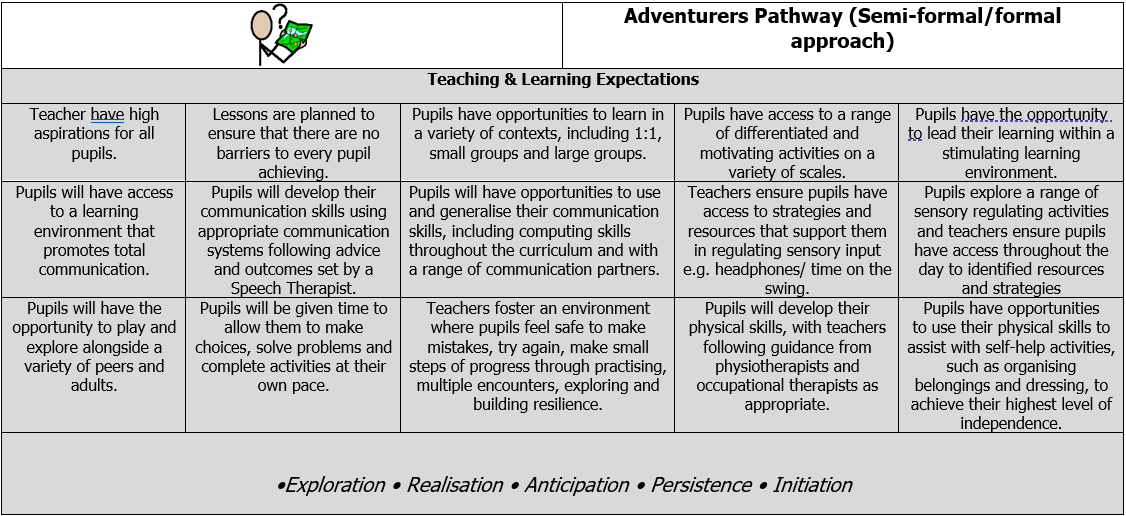
Riverwalk Curriculum: The Six Areas of Learning
Six Areas of Learning
Riverwalk Curriculum is divided into six areas of learning, designed to promote pupils’ holistic development. Each area includes links to National Curriculum subjects, as well as other enriching aspects of learning that facilitate a bespoke, optimal educational experience for each pupil, reflecting their complex needs. Each of the six areas is represented by a different colour, which is reflected in teachers planning and class timetables.
At Riverwalk, we promote the spiritual, moral, cultural, mental, and physical development of pupils at the school and of society. We prepare pupils at the school for the opportunities, responsibilities, and future anticipated experiences.
Fun and engaging sessions are planned and delivered through the below six broad areas of learning following Riverwalk’s developmental curriculum outcomes organised into the Engagement, Partnership and Team Pathways. We also draw upon Consortium Trust’s Drivers, The National Curriculum subject areas and individual pupils’ Education Health Care Plans.
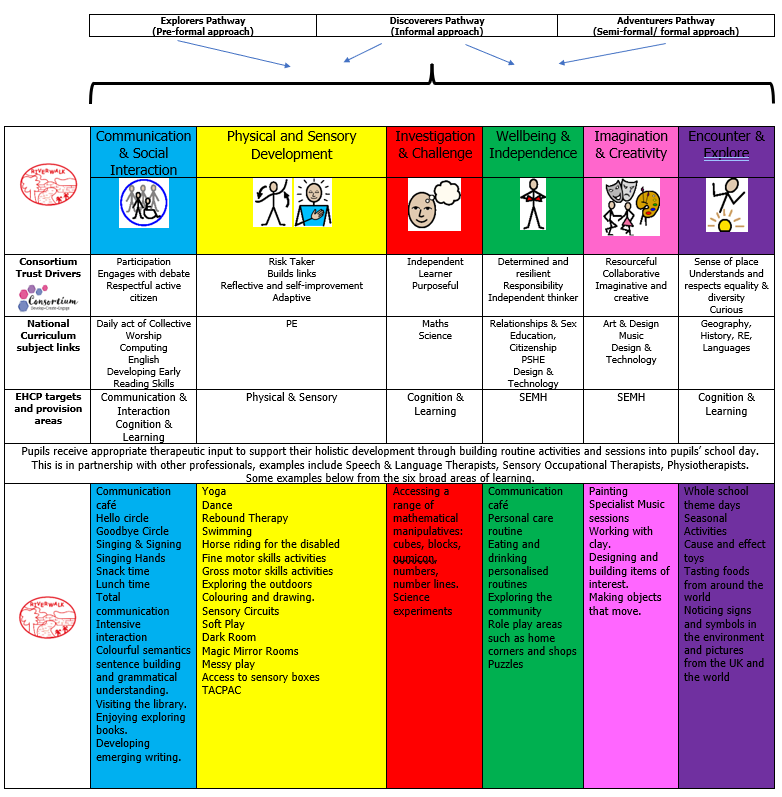
Supporting statements for AREAS of learning
Communication and Social Interaction
At Riverwalk, we use a total communication approach. Our principal aim is to develop pupils’ knowledge, skills and understanding across all these areas and towards pupils’ ‘Personal Learning Goals’ (PLGs).
We appreciate the importance of teaching the fundamental skills for children to express their wants and needs from a young age and develop the skills of Exploration, Realisation, Anticipation, Persistence and Initiation. Pupils are encouraged to work collaboratively, share their thoughts and ideas and practice speaking in sentences before being expected to write them. Pupils who struggle with communication and language are quickly identified and supported by working closely with the SALT Team to ensure that we provide the correct interventions to specific pupils.
We encourage pupils to write across the curriculum in different subjects and ensure they enjoy the chance to hear stories and take part in drama.
We follow the Twinkl Phonics scheme to teach early reading. This teaches phonics in a lively and engaging way, which encourages pupils to sound out and blend words quickly. Our phonics lessons are comprised of the speaking, handwriting, listening, spelling and reading elements of Twinkl Phonics.
In the program, pupils learn sounds and the letters representing them and how to form them. Then, they read books written using only the letters they have learnt (and a small number of separately taught 'tricky words'). This gives our pupils plenty of early success and builds up their reading confidence.
As a school, we understand the importance of reading for pleasure and make time each day to share stories together as a class every day and individually.
Because we value the importance of pupils reading at home, we encourage them to take books home to share with parents and carers.
In Computing, we learn how a computer follows instructions and how to make technology work through programming and how to use the internet responsibly and safely.
We believe computing has a vital role to play in this digital time. We use computing in many areas of the curriculum to enrich learning opportunities, while also empowering pupils to be conscientious and critical digital citizens. The school recognizes the importance and its duty to keep pupils safe online and holds regular online safety events as well as online safety lessons.
Investigation and Challenge
All pupils are encouraged to be the best they can be and are taught the knowledge and skills needed to access mathematics within every lesson. Our aspirational pupils are taught to independently select their level of challenge in most lessons, which positively impacts on attitudes to mathematics. All contributions are valued within mathematics learning and pupils know to persevere when faced with a challenge and mistakes are celebrated. Teachers model resilient behaviors and both pupils and staff use their executive function skills to be effective and reflective learners.
When teaching maths, pupils are exposed to concrete, pictorial and abstract representations. Pupils use manipulatives and have access to these during every mathematics lesson.
In Science we learn to ask questions about why things happen in the ‘world around me’ and find out answers by investigating and testing.
At Riverwalk we want to ensure that all pupils are aspirational and inspired. Therefore, we teach Science and Outdoor Learning every week across the school creating a love of science and stimulating curiosity from an early age. Some of these sessions take place in our outdoor learning space and around different school areas. We want our pupils to be able to think scientifically and take risks with their learning through hands-on outdoor experiences and enquiries. Throughout school the pupils are taught the skills of enquiry; asking questions, making predictions, setting up tests, observing and measuring, communicating and interpreting results and evaluating. We want pupils to feel passionate about caring for the environment and living things and to develop an understanding of the effects of the everyday choices which we all make. This is why we intertwine Science with outdoor learning knowledge and skills to foster these through experiences.
Wellbeing and Independence
Personal, Social and Health Education (PSHE) is taught and embedded in all we do and is taught discreetly through a variety of ways and across many areas, including through pupils’ PLGs with the intention to encourage and support pupils to think about and develop a range of essential life skills and qualities.
It is important that pupils learn about making good choices. We teach relevant and interesting lessons, which inspire and encourage pupils to think about and discuss their feelings and viewpoints. We promote these and other values and encourage positive behavior both at home and at school. To complement this, Riverwalk delivers relevant learning experiences to help pupils develop positive relationships with themselves and others. This mindful approach supports our focus on pupils' mental health, wellbeing, social and emotional development.
Pupils learn through hands-on experiences to develop fine and gross motor skills, to assess and manage risk, to practice and achieve goals, to enquire and investigate, whilst embracing the challenges that working inside and outside in all weathers can present.
Imagination and Creativity
In Imagination and Creativity our curriculum aims to help the pupils develop creatively and to foster an understanding and enjoyment of art, throughout the school. Pupils are taught to represent in visual form what they observe, remember and imagine. They are encouraged to develop sequential skills in drawing, painting, 3D, textiles and digitally. Our pupils work practically and imaginatively with a variety of materials, tools and methods, exploring the elements of art and design, including color mixing, texture, pattern and form in two and three dimensions. Pupils are taught skills to help them succeed in using different mediums, media and materials and final pieces are celebrated as well as the process. We also explore designing and making products for a purpose, and then evaluating how successful they are.
At Riverwalk, we encourage pupils to participate in a variety of appreciative music, singing, moving and playing instruments through which we aim to build up the confidence of all pupils. Music is a creative and enjoyable activity. The pupils take part in a weekly singing assembly and signing choir which helps our pupils feel part of our school community. We provide opportunities for all pupils to create, play, perform and enjoy music, to develop the skills to appreciate a wide variety of musical forms and genres from diverse musicians old and new.
Physical and Sensory Development
We aim to give all pupils the opportunity to participate in physical activities. Sessions are delivered in safe and supportive environments. Sessions are tailored to develop both gross and fine motor skills, as we recognise that physical skills such as attention, balance and coordination underpin learning. We also offer a range of enrichment activities that introduce a wider physical and sensory diet for those who can access them, which may include swimming, horse-riding, and rebound therapy. Riverwalk strives to promote enjoyment of physical activity and challenge, providing opportunities for this within the school curriculum. This joy of physical exploration will continue to support pupils’ health, fitness, and mental well-being, leading them to more active, healthy lifestyles, both in school and beyondAt Riverwalk, we encourage pupils to explore the world around them through a variety of sensory experiences. Sensory engagement enriches pupils’ understanding of the world, and by supporting tactile learning styles we promote constant exploration through the senses.
By integrating sensory learning from the very beginning, we seek to support our pupils' development of self-regulation skills so that they can begin to access personal learning goals (PLGs) and make progress.
Encounter and Explore
At Riverwalk, we focus on understanding ourselves and the world around us. When teaching History, we begin in the very recent past, looking at the pupils' own history; their family experiences and photographs. We also focus on local changes. The use of historical artefacts and visits to local places of interest help pupils to understand how and why changes occur. We commemorate significant historical events and use stories from the past to help the pupils' historical understanding. We encourage and develop deeper thinking, historical vocabulary, asking questions and the forming of opinions based on what we have found out. Each class has a timeline with significant events to help pupils develop chronological awareness as well as a sense of world and British History.
We recognize that geography should develop a child’s natural curiosity and fascination about the world. We ensure all our learning starts with the pupils' local area, encouraging pupils to explore the school grounds and surrounding area. This will lead to a greater understanding of places and people and a greater awareness of their own place within our world and community. It should help provoke and answer questions about both natural and human aspects of the world. We want pupils to feel connected to the world around them and recognise the important part we all play in looking after it. Pupils will have opportunities to explore and investigate their local area using geographical fieldwork skills and they will seek to make comparisons with other regions in the United Kingdom and the rest of the world. They will learn how to draw and interpret maps of their school, local area, United Kingdom and the world. Through carefully planned experiences, pupils will develop skills that enable them to recognise, describe, explain, compare and evaluate natural and human aspects of the world, gaining respect and appreciation of the world we live in, different cultures and ways of life. We encourage and develop deeper thinking, geographical vocabulary, by asking questions and forming opinions based on what we have found out.
In RE we learn about different religions of the world and their traditions, practices and beliefs. We accept and celebrate how everyone’s lives are unique and may have things that are the same or different.
Pupils are taught to have respect for people’s beliefs focusing on the religions of Christianity, Judaism, Islam, Hinduism and people with multiple faiths or those with no religion, in a way that is appropriate to their age and level of understanding. Assemblies provide opportunities for moral and spiritual development using a variety of poems, stories, music and occasional visits from different visitors linking with the local community.
Parents/carers have the right to withdraw their child from all of part of RE.
Curriculum Themes
Curriculum Themes
Riverwalk curriculum is planned through thematic approach which has “rich texts” at the heart of planning. Our themes span over most subject links, providing more coherent learning experiences for each class, as outlined in Riverwalk School’s theme map. Lower, Middle and Upper school each follow a 4-year rolling cycle of topics in a spiralling curriculum design; this means that pupils have the chance to revisit a theme as they progress through the school, each time consolidating deeper knowledge and understanding.
Riverwalk Theme Map
Greene Road (EYFS / KS1)

Lower, Middle and Upper School
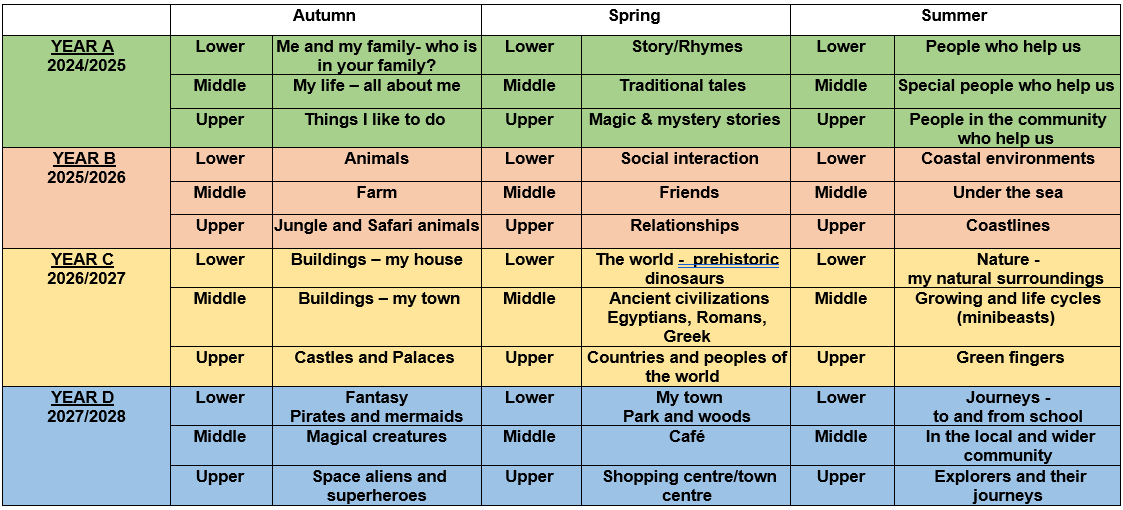
POST-16

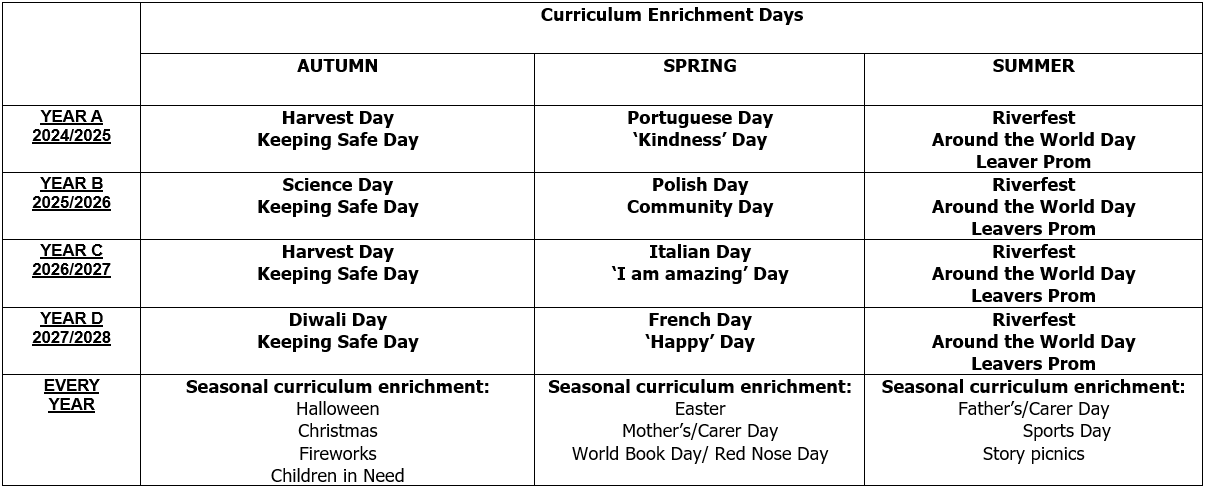
Riverwalk Lower School Classes & their Curriculum Pathways

Riverwalk Middle School Classes & their Curriculum Pathways

Riverwalk Upper School Classes & their Curriculum Pathways

Riverwalk School Post 16 Classes & their Curriculum Pathways

EYFS and Post 16
Foundation Stage
Early Years Foundation Stage (EYFS) planning is underpinned by Development Matters, focusing on three prime areas of development: personal, social and emotional development (PSED), Communication and language (CL) and Physical Development (PD).
- Sensory Integration: Activities first introduced in EYFS that are designed to enhance sensory processing and motor skills, to support self-regulation (soothing).
Post-16 Provision
Our post-16 provision focuses teaching and learning on four learning domains: having good health, independent living and life skills, employment and vocational and exploring personal interests.
- Pathways to Adulthood: Tailored learning experiences support transition to adulthood and promote life skills.
- Accreditation: Riverwalk pupils start AQA accreditation in year 11. They leave post 16 provision with accredited outcomes through Life Skills, aligned with Preparing for Adulthood.
- Work Experience: Enterprise program and in-house work experience build real-world skills and confidence.
Implementation Strategies, Monitoring and Evaluation
Staff Training and Development
- Regular professional development, led by specialists, to equip staff with the latest SEND strategies and interventions and medical requirements to meet the needs of our pupils.
- All staff participate in an annual appraisal process carried out by their line manager, where their professional development needs and interests are identified and action plans are drawn up and kept under review
- Collaborative planning among teachers, sharing best practice with all stakeholders involved in pupils’ learning.
- Subject leaders support colleagues with sharing specific subject-related research and developments, advising on practice and carrying out audits,
Resource Allocation
- Providing specific resources, tailored to pupils’ needs, as advised by specialized services involved in pupils learning and care.
- Ensuring adequately trained support staff, including HLTAs, teaching assistants, and therapy teams.
Environment and Facilities
- Maintaining a safe, accessible, and stimulating learning environment with appropriate adaptations for physical and sensory needs.
- Incorporating quiet spaces and sensory rooms to support emotional regulation and well-being.
- Using specialist rooms and outdoor areas, to address pupils’ individual needs, interests, offer a breadth of learning experiences and to develop social skills.
Monitoring and Evaluation
Implementation Process (Explore, Prepare, Deliver, Sustain)
- Collecting and analyzing pupils’ progress and engagement to inform and refine curriculum adaptations.
- Regularly reviewing teaching practices and learning outcomes to ensure alignment with curriculum goals.
- Observing and identifying individual priority learning needs, setting learning goals in collaboration with other stakeholders and specialists.
Stakeholder Feedback
- Gathering input from pupils, parents, staff, and external partners to continuously improve and enrich the curriculum.
- Conducting annual reviews and setting strategic goals based on feedback and assessment results.
